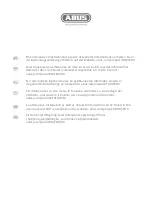
EMC Guidance and Manufacturer’s Declaration 16-1
16
EMC Guidance and
Manufacturer’s Declaration
The system complies with the EMC standard IEC 60601-1-2: 2007.
WARNING:
1. The use of unapproved accessories may diminish system
performance.
2. Use of components, accessories, probes, and cables other
than those specified may result in increased emission or
decreased immunity of system.
3. The system or its components should not be used adjacent to
or stacked with other equipment. If adjacent or stacked use is
necessary, the system or its components should be observed
to verify normal operation in the configuration in which it will
be used.
4. Operation of system, in the case that the patient physiological
signal is lower than the minimum amplitude or value specified
in the product specifications, results may be inaccurate
(results can be obtained when the HR is in the range of 30-250
bmp or when the QRS wave amplitude is between 0.5-5 mV.)
5. Wireless LAN communication specifications:
Communication protocol: 802.11 b/ g/n
Communication frequency: 2.4-2.4835GHz
Modulation mode: BPSK/QPSK/16QAM/64QAM
DBPSK/DQPSK/CCCK
Transmission power:
≤
20dBm(EIRP)
Other devices may interfere with this system even though they
meet the requirements of CISPR in the corresponding
standards.
NOTE:
1. The system needs special precautions regarding EMC and needs to be
installed and put into service according to the EMC information provided below.
2. Other devices may interfere with this system even though they meet the
requirements of
CISPR
in the corresponding standards.
3. Preventing conducted RF immunity. Due to technological limitations, the
conducted RF immunity level are limited to 3 Vrms level, conducted RF
interference above 3Vrms may cause wrong diagnosis and measurements. We
suggest that you position system further from sources of conducted RF noise.
4. Portable and mobile RF communications equipment can affects system. See
tables 1, 2, 3, and 4 below.
If the system is operated within the electromagnetic environment listed in Table 2 and Table 3, the
system will remain safe and will provide the following basic performances:
















































